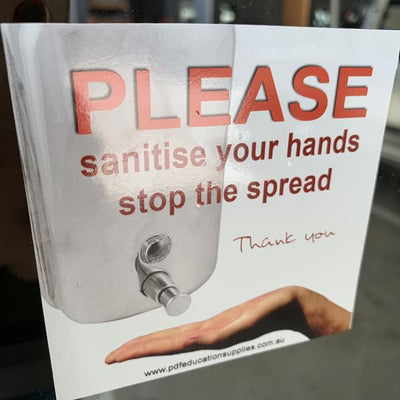Sanitise hands on arrival
We are all aware of the current Coronavirus and with this in mind it is more important than ever that we follow correct hygiene procedures. Clean hands has always and will always be one of our best forms of defence against all germs.
PDF Education Supplies is committed to the healthy and safety of all, hence why we have added this vinyl sticker to our range it will act as a reminder to all that you require them to sanitise their hands prior to entry.
Germs from unwashed hands can be transferred to other objects, like handrails, table tops, or toys, and then transferred to another person's hands.
-
Jan 31, 2020
Correct storage of medication
It is vital that all medicine is stored away from children in a locked cabinet.
This vinyl sticker will indicate where it is stored and also show that you have followed the correct procedures. www.pdfeducationsupplies.com.au
-
Sep 20, 2016
Keeping parents informed of illnesses
It is important and a requirement of the Occupational Health and Safety Regulation to keep a record of any illness or injury occurring to a centre staff, child, other staff member or visitor to the centre for the effective management of the illness or injury, and to help prevent future occurrences. Public liability, workers compensation and personal sickness and injury insurance policies also require to be informed.
This laminated poster will keep parents informed, simple write on and wipe off www.pdfeducationsupplies.com.au
-
Sep 05, 2016
Safe Food Handing
Food borne illness commonly occurs in settings where food is prepared or served to a large number of people, and types of illness include bacterial and viral gastroenteritis, food poisoning from toxin producing bacterial contamination, and potentially serious infections such as hepatitis A, salmonella, shigella, and shiga-like toxin producing Escherichia coli
It is vital that services have a designated area for food preparation and storage, which is safe and hygienic.
-
Sep 01, 2016
Storage of Dangerous Goods
This vinyl sticker will ensure that it does not fall off the cupboard and all are aware of potential dangers storage The centre will protect child centre staff, children, families and visitors from the risks associated with chemical products, medicines, other dangerous substances and dangerous equipment used in the centre and environs. Accidental poisoning is the second most common hospital admission for child injuries in Australia, and 75% of accidental poisonings are attributed to medications. The most common accidental poisonings involve respiratory and cough medications, antihistamines, paracetamol, iron tablets, benzodiazepines, and eucalyptus and other vapouriser oils. Other main agents of poisoning in children are household chemicals, especially pesticides including snail bait and mothballs, bleach and other cleaners, detergents, solvents, petroleum and kerosene and cosmetics. Many of these chemical products are routinely used in children’s centres and are potentially hazardous, either by ingestion, inhalation or skin contact. Pesticides and volatile chemicals...
-
Jul 25, 2016
Showing 1 - 5 of 5 results






